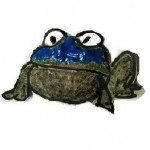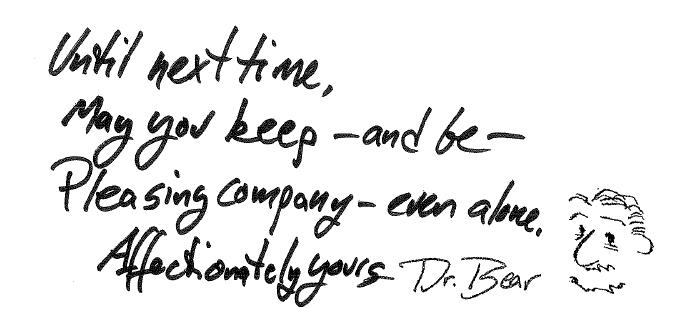At a certain point this week, we generated a bit of discussion by posting a 2300 year old quote:
Before looking for something to eat and drink, we should look for someone to eat and drink with, for to dine alone is to lead the life of a lion or wolf.
—Epicurus
Several of you neither mind eating alone, nor mind the comparison to the lion or the wolf. Woad Toad—who prefers misanthropic to antisocial—points
out that both lions and wolves are pack animals—social, that is; toads and polar bears eat alone (and are majestic creatures).
This was an interesting point. I live with a misanthropic (and rather smelly) Cairn terrier who refuses to eat alone. Although his food bowl is there all day, he refuses to eat without somebody nearby. I often end my days standing in the kitchen keeping him company, just so he will finish his meal.
I don’t mind; it’s a small price to pay for another creature’s well-being and happiness, isn’t it?
In case you were wondering, Epicurus was a Greek Philosopher who lived from 341 BC to 271 BC, give or take. He was a thoroughgoing materialist—an atomist, really. He taught that the key to happiness was pleasure, but that we must learn to distinguish between healthy pleasures and destructive cravings. He taught that the most gratifying pleasures were simple, constructive ones—simple but good food, maybe a little cheese, conversation with friends, quiet time in one’s library, time to enjoy nature, etc.
who lived from 341 BC to 271 BC, give or take. He was a thoroughgoing materialist—an atomist, really. He taught that the key to happiness was pleasure, but that we must learn to distinguish between healthy pleasures and destructive cravings. He taught that the most gratifying pleasures were simple, constructive ones—simple but good food, maybe a little cheese, conversation with friends, quiet time in one’s library, time to enjoy nature, etc.
But, yes, he taught that time spent with friends was a necessary to a good life and as nourishing as food and drink.
In fact, he bought a big enough house that he could always have his friends nearby.
Life, in general, is made better by having friends. Of course, we are all aware of how important it is to have friends in a crisis—that lost job, failed marriage, lost child, crappy day at work, diss’ by boyfriend, or even just rain. Yet even good experiences are made better when shared—it seems even more fun when done together. In fact, one of the reasons so many people text or upload pictures is in order to pretend that they have  friends who are there.
friends who are there.
Food is also improved by company—you can talk about how good it is (or bad, if that, and laugh), and the joy of good company adds to the joy of good food, as good food adds to the joy of company. To sit around a table, unhurried, and eat slowly, and talk for hours is a joy like no other. Companionship multiplies itself—you say something funny, one of your companions says something funny, and that prompts you to say something even funnier you would not have thought of alone. All the while, you are enjoying the closeness of each other, the warmth of the place, and the pleasant sensations of good food.
What could be better?
Of course, my lion friends—such as Kirsten and Rachel  (longtime friends of the Bistro, each)—maintain that it is pleasant to eat quietly, by oneself, perhaps in the company of a book. I’ve realized that I do this a lot—in fact, I eat more meals alone than I do with company. When one works with the public, it is often pleasant, and sometimes necessary, to be quiet and alone. Solitude is not the same thing as loneliness—in fact, if you are with a book, it might not even be solitude. By contrast, chatter for its own sake is no better than cold, greasy fast food.
(longtime friends of the Bistro, each)—maintain that it is pleasant to eat quietly, by oneself, perhaps in the company of a book. I’ve realized that I do this a lot—in fact, I eat more meals alone than I do with company. When one works with the public, it is often pleasant, and sometimes necessary, to be quiet and alone. Solitude is not the same thing as loneliness—in fact, if you are with a book, it might not even be solitude. By contrast, chatter for its own sake is no better than cold, greasy fast food.
I guess I’ve given a philosopher’s answer then: both yes and no.
You need time alone, and can enjoy it, but—at least once a week—try to eat with someone else and see what they add to your meal. Some more continental eating places (like Jack of the Woods in Asheville) even have common tables, so that it is unavoidable to eat together.
Food is a necessity, but it can also be a pleasure; why not allow it to be both as much as possible?
Companionship is a necessity, but it can also be a pleasure; why not also allow it to be both as much as possible?
Eating together is a way to combine these necessities and these pleasures in a way that multiplies them; why not?


